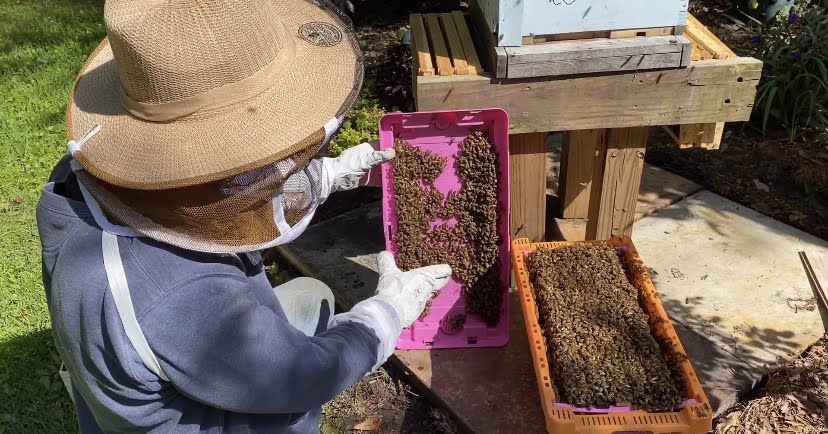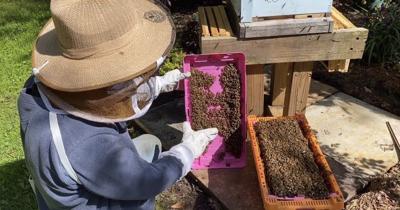Two years ago, we adopted a bee colony. It didn’t go so well.
The colony steadily declined over the summer until robber bees stole what little honey was in the hive. What went wrong? The queen was older maybe, or she was gone. It could’ve been varroa mites. The more people I asked, the more advice I got, and it was rarely the same advice. Nowadays, I rely on a few local experts like Jim Strohm, president of the Charleston Community Bee Gardens, and the good folks at R and R Acres.
We decided to try again this year. The deadline to locally order a nuclear colony, or "nuc," through the Charleston Area Beekeeping Association was in January. Orders need to be placed early for spring pick up. We missed it by a few days.
Fortunately, R and R Acres in Jamestown was still taking orders. In mid-April, we drove an hour to pick up a 5-frame nuc at dusk when the worker bees have returned to the hive. The colony made the hour-long trip home in the back of my truck. We placed the nuc on top of a 10-frame deep box already in the backyard.
In the morning, we suited up with veil, gloves and sweatshirts and smoked the colony. Smoke calms the bees and masks communication pheromones. No one wants stinging, including bees. Their stinger is a barbed ovipositor that gets pulled out of their abdomen when they stick you. You end up with a welt and the bee dies. No one is happy.
We opened the nuc to find five frames fully drawn out with comb and loaded with capped brood. The majority of bees are female workers that build comb, feed brood, clean the cells and forage for pollen and nectar. The males are drones that only mate with a queen. They are the first to be kicked out of the colony when food is scarce.
The queen is the most important bee in the colony. She is the egg-laying machine that the workers serve. Until this year, I’ve never seen a queen bee. I’ve been to dozens of demonstrations where the beekeeper says, “There she is. See? She’s right there.” There are just too many bees to locate the one with a larger abdomen.

Bees follow the queen's pheromones and march into the hive to find her. Provided
This time, however, the queen had been marked with a bright green dot on the thorax. Without the queen, the colony fails. We knew we had her. And based on the number of capped cells, she was healthy and active. We took the frames out of the nuc and alternated them with empty frames in our deep box.
Quite a few workers remained in the nuc, so we leaned the box against the hive. The workers know where the queen is by way of pheromones and marched up the stand and into the small entrance.
With our first hive, we had used an external sugar water feeder. This, I’ve been told, will attract robber bees in fall. And this happened. This time, we used an internal feeder only accessible from inside the hive. My mentors suggest feeding the colony sugar water until eight frames are drawn out with comb to give the colony time to learn the new surroundings. Our first hive never drew out eight frames. This one did it in two weeks.
We stopped feeding sugar water and added another deep box on top of the first one. This will allow more room for the queen to lay eggs and grow the colony. Two weeks later, the second box was halfway drawn out with comb and heavy with honey. We won’t harvest any honey this year. Bees will need it to survive the lean parts of fall and winter when flowers are scarce.
Next year, however, we’re hoping to pull some honey. In order to do that, we’ll use a queen excluding screen to keep her from laying eggs in a shallow box on top of the hive. Only the workers will have access to store honey. But that’s next year. This year, we’ll just enjoy the show and watch them return home with baskets full of pollen.












